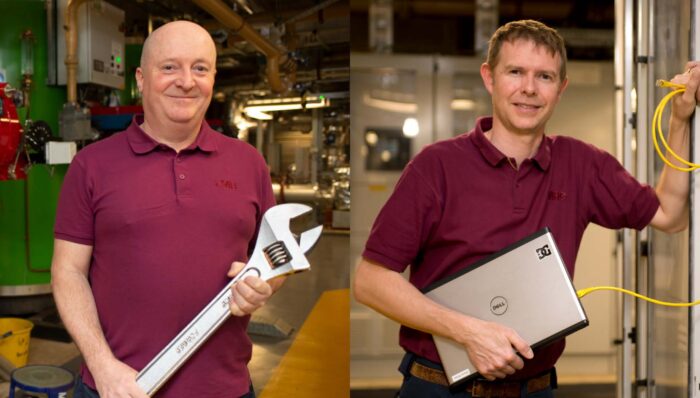
The LMB Technician’s Committee actively supports professional registration, which formally recognises the unique skill set of technical specialists. Here, David Street and Andy Mace, who both recently achieved Professional Registration to become registered Engineering Technicians, share their motivations and experiences of the registration process.
David Street
What is your position at the LMB?
I am an Electrical Technician for the LMB Estates and Facilities Department. My role is to help maintain the buildings services infrastructure through both reactive and proactive maintenance. I help make sure the electrical systems conform to the latest regulations and statutory requirements. I am also heavily involved in the conversion of all the buildings lights to new LED technology in the most sustainable way.
Why did you decide to pursue professional registration and what have you gained from it?
I heard about the LMB joining the Technician Commitment and supporting technicians to become professionally registered. It was not something I had considered before but it seemed like a good way to add to my portfolio of qualifications and prove my skills. I got a great deal of satisfaction from gaining the qualification and it will stand me in good stead for future promotion and career progression.
What did you have to do to become registered?
I firstly had to choose a relevant awarding body to join that was licenced by the Engineering Council to give the award. Once I had joined the Society of Operations Engineers, I went about putting the evidence together for proving my qualifications and skills by writing up case studies of work I have completed recently. You also have to provide evidence of CPD (continuing professional development) which will continue throughout my membership. Writing up the case studies was probably the most demanding part and really made me think about the work I do and how it proves my competency.
Would you recommend registration to others?
Yes I would, the qualification you get being professionally registered proves your competency, knowledge and experience within your field of work. It’s a great addition to your CV and will enhance your career prospects. Recording your CPD encourages you to stay up to date with the latest developments in your profession and to continue with training and development.
Andy Mace
What is your position at the LMB?
I am a Mechanical Technician responsible for the mechanical servicing and repairs at the LMB building, alongside other MRC sites within the Cambridge region. I provide mechanical planned, preventive and reactive maintenance on all plant, systems and services. This includes air compressors, chillers, laboratory gas systems, reverse osmosis deionised water systems, steam boilers, ground source heat pumps (GSHP), heating ventilation and air conditioning (HVAC), Air Handling units (AHU), humidification and dehumidification, and also the monitoring and fault diagnostics of the Building Management Systems (BMS).
Why did you decide to pursue professional registration and what have you gained from it?
I decided to pursue professional registration in order to get my qualifications verified, as this indicates both my competence and commitment to the profession. One of the benefits of being registered with a professional body such as the Society of Operations Engineers is that it also allows you access to a network of CPD providers so you can keep your knowledge and skillset up to date.
What did you have to do to become registered?
To become registered, you must first join a professional body relevant to your profession, which in my case was the engineering council, who help guide you towards registration. You then have to find a sponsor registered within that professional body who can verify your position and check your academic qualifications, certificates, etc. You also need to submit your CV and any CPD, and career plan. Your Engineering Technician registration will also be assessed from your training and experience statement against five areas of competence outlined by UK-SPEC. Once you have completed your statements and had any other relevant paperwork verified, you can then submit your application to the marking panel for review.
Would you recommend registration to others?
Yes, registration is a good way to enhance your CV and professionally registered status shows employers that you have and are committed to maintaining and enhancing the knowledge, skills and competence required to meet the engineering and technological needs of today.
Further references
Technicians make it happen
Professional registration and awards: Celebrating the Technician’s Commitment at the LMB